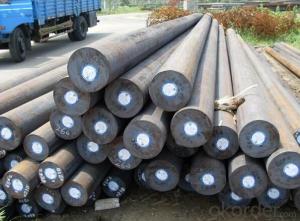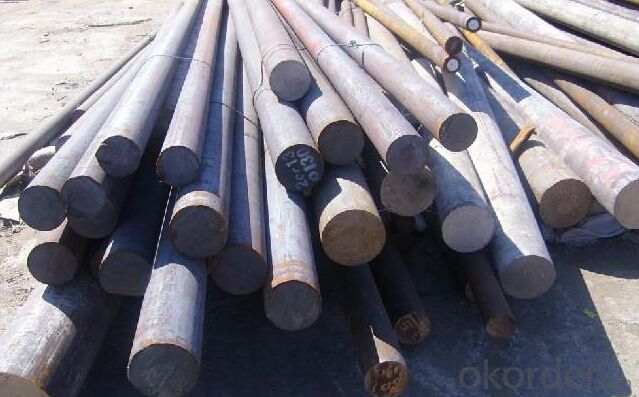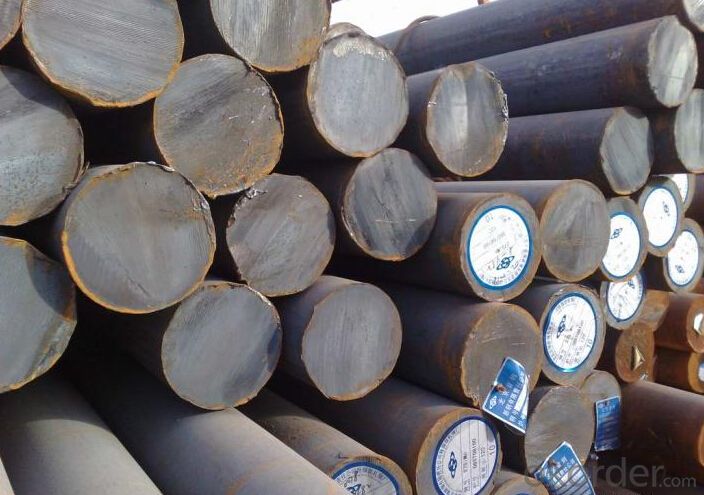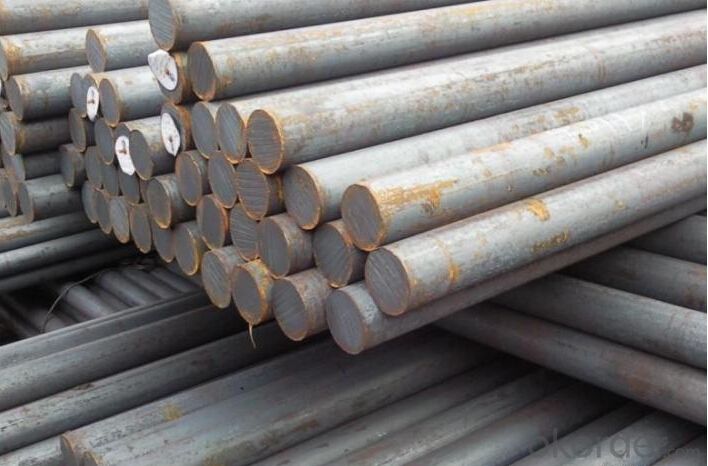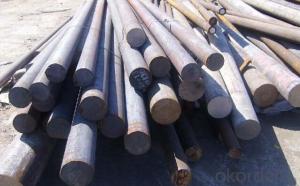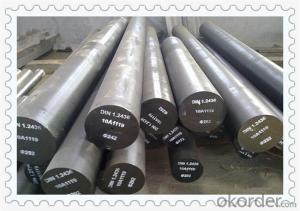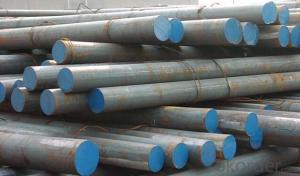Grade C35 Carbon Steel Round Bars in Stock
- Loading Port:
- Shanghai
- Payment Terms:
- TT OR LC
- Min Order Qty:
- 3 m.t.
- Supply Capability:
- 100000 m.t./month
OKorder Service Pledge
OKorder Financial Service
You Might Also Like
Specification
Grade C35 Carbon Steel Round Bars in Stock
Details Information of Grade C35 Carbon Steel Round Bars in Stock
| Item | carbon steel bar C35,carbon steel rod,carbon steel shaft | |
| Model No. | Q235B,Q345B,A36,SS330,SS400,SAE1045,Q195,Q215,10#,15#, 25#,30#,1010,1015,1020,1025,1030 | |
| Standard | ASTM,AISI,JIS,DIN,GB,EN | |
| Size | round | Diameter:4mm-800mm |
| Length:1-12m,or as required | ||
| flat | Width:3mm-3000mm | |
| Thickness:0.3mm-200mm | ||
| Length:1m-12m,or as required | ||
| square | Diameter:2mm*2mm-800*800mm | |
| Length:1m-12m,or as required | ||
| angle | Width:10mm*10mm-400mm*400mm | |
| Length:1m-12m,or as required | ||
| hexagonal | Diameter:4mm-800mm | |
| Length:1m-12m, | ||
| Delivery time | Prompt or according to the order quantity. | |
| Trade terms | Payment terms:T/T,L/C,western union | |
| Price terms:FOB,CFR,CIF,EXW | ||
| Package | Standard export seaworthy package, or as required. | |
| Application | Steel bar applies to petroleum,chemical industry,electric power, boiler,high temperature resistant,low temperature resistant, corrosion resistant.Carbon steel bar also can be made accroding to the customer's requirement. | |
| Contact | If you have any question,please feel free to contact me. | |
Chemical Composition of Grade C35 Carbon Steel Round Bars in Stock
| C | Si | Mn | P | S | Cr | Ni | Cu |
| 0.17-0.24 | 0.17-0.37 | 0.35-0.65 | ≤0.035 | ≤0.035 | ≤0.25 | ≤0.25 | ≤0.25 |
| Tensile strength (σb/MPa) | Yield strength (σb/MPa) | Elongation (δ5/%) |
| ≥410(42) | ≥245(25) | ≥25 |
Company Introduction of Grade C35 Carbon Steel Round Bars in Stock
CNBM International Corporation is the most import and export platform of CNBM group(China National Building Material Group Corporation) ,which is a state-owned enterprise, ranked in 270th of Fortune Global 500 in 2015.
With its advantages, CNBM International are mainly concentrate on Cement, Glass, Iron and Steel, Ceramics industries and devotes herself for supplying high quality series of refractories as well as technical consultancies and logistics solution.
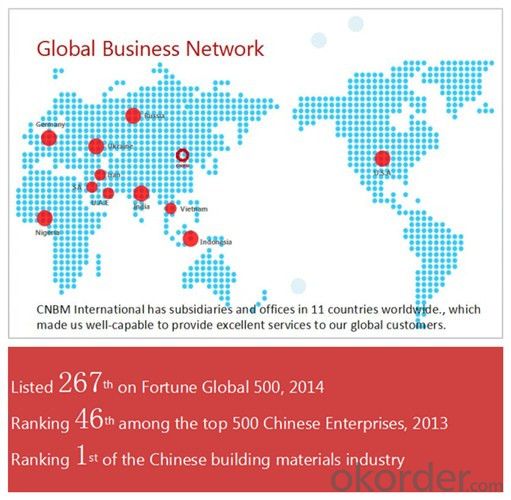
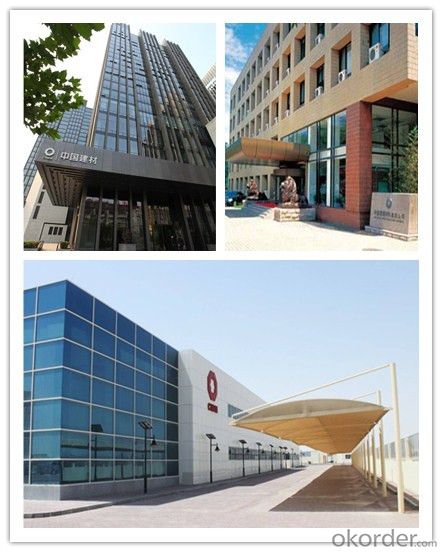
Certificates of Grade C35 Carbon Steel Round Bars in Stock
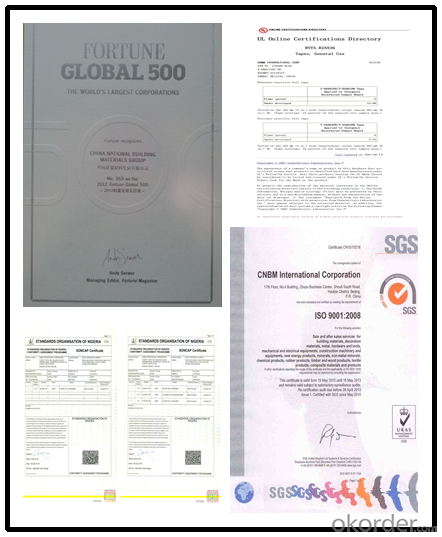
Packaging & Delivery of Grade C35 Carbon Steel Round Bars in Stock
Packaging Detail | Sea worthy packing /as per customer's packing instruction |
Delivery Detail | 15 ~ 40 days after receiving the deposit |
Products show of Grade C35 Carbon Steel Round Bars in Stock
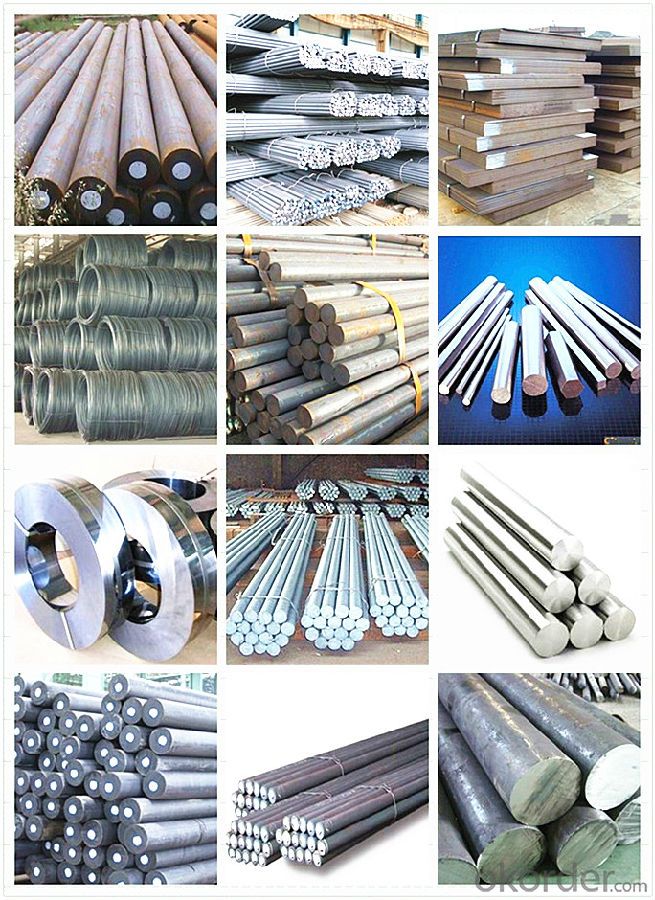
FAQ
Are you a trading company or manufacturer? | Manufacturer |
What’s the MOQ? | 3 metric ton |
What’s your delivery time? | 15-35 days after downpayment received |
Do you Accept OEM service? | Yes |
what’s your delivery terms? | FOB/CFR/CIF |
What's the Payment Terms? | 30% as deposit,70% before shipment by T/T |
Western Union acceptable for small amount. | |
L/C acceptable for large amount. | |
Scrow ,Paybal,Alipay are also ok | |
Why choose us? | Chose happens because of quality, then price, We can give you both. Additionally, we can also offer professional products inquiry, products knowledge train (for agents), smooth goods delivery, excellent customer solution proposals. |
What's your available port of Shipment? | Main Port, China |
What’s your featured services? | Our service formula: good quality+ good price+ good service=customer's trust
|
Where are your Market? | Covering more than 160 countries in the world |
- Q: How is special steel used in the aerospace industry?
- Special steel is used in the aerospace industry for various applications due to its exceptional properties. It is used to manufacture critical components such as aircraft engines, landing gear, and structural parts. The high strength-to-weight ratio, corrosion resistance, and heat resistance of special steel make it a preferred choice for withstanding extreme conditions and ensuring the safety and reliability of aerospace equipment.
- Q: What are the different classifications of special steel?
- There are several classifications of special steel, including stainless steel, tool steel, high-speed steel, alloy steel, and carbon steel.
- Q: Can special steel be used in renewable energy applications?
- Yes, special steel can indeed be used in renewable energy applications. Special steel refers to high-performance alloys that possess specific properties such as high strength, corrosion resistance, and temperature resistance. These properties make special steel an excellent choice for various components used in renewable energy technologies. In wind energy, for example, special steel is used in the manufacturing of wind turbine components such as rotor shafts, gears, and bearings. The high strength and fatigue resistance of special steel ensure the durability and reliability of these components, allowing them to withstand harsh environmental conditions and prolonged use. Special steel is also utilized in solar power systems. Solar panels require sturdy and corrosion-resistant frames to support and protect the delicate photovoltaic cells. Special steel provides the necessary strength and resistance to weathering, ensuring the longevity of solar panels in outdoor installations. Furthermore, in hydropower applications, special steel is employed in the construction of turbines, penstocks, and other components that are exposed to high-pressure and corrosive environments. The excellent resistance to erosion, cavitation, and corrosion of special steel ensures the efficient and reliable operation of hydropower plants. Additionally, special steel finds applications in the manufacturing of batteries used in renewable energy storage systems. The high strength and thermal stability of special steel are crucial for the containment and protection of battery cells, ensuring their safe operation. In summary, special steel is well-suited for renewable energy applications due to its exceptional mechanical properties and resistance to corrosion and high temperatures. Its utilization in wind turbines, solar panels, hydropower systems, and energy storage technologies enhances the performance and reliability of these renewable energy solutions.
- Q: How does the heat treatment process affect the properties of special steel?
- The properties of special steel are greatly affected by the heat treatment process. This process involves controlled heating and cooling of the steel to modify its microstructure and, as a result, its mechanical properties. To begin, heat treatment can increase the hardness of special steel. By heating the steel to a specific temperature and then rapidly cooling it through quenching, the steel undergoes a phase transformation that boosts its hardness. This is especially advantageous for applications that demand high strength and resistance to wear, such as cutting tools or bearings. Furthermore, heat treatment can enhance the toughness of special steel. By tempering the quenched steel at a lower temperature, the brittleness caused by rapid cooling can be minimized, leading to improved toughness and ability to withstand impacts. This is crucial in applications where the steel must endure sudden shocks or impacts, like in automotive or aerospace components. Moreover, heat treatment can also improve the overall strength of special steel. Through a combination of heating, cooling, and tempering processes, the steel's grain structure can be refined, resulting in increased strength and resistance to deformation. This is particularly critical for structural applications where the steel must withstand heavy loads or extreme conditions. Additionally, the heat treatment process can influence the corrosion resistance of special steel. By subjecting the steel to specific heat treatment cycles, the formation of certain phases or chemical compounds can be encouraged, leading to enhanced resistance against corrosion or oxidation. This is essential for applications exposed to harsh environments or corrosive substances, such as in marine or chemical industries. In conclusion, the heat treatment process is essential in modifying the properties of special steel. By carefully controlling the heating, cooling, and tempering cycles, the hardness, toughness, strength, and corrosion resistance of the steel can be significantly improved. This allows for the production of special steel with customized properties to meet the specific requirements of various industrial applications.
- Q: What are the main advantages of using special steel in the power generation industry?
- Special steel offers several advantages in the power generation industry. Firstly, its high strength and durability make it suitable for withstanding the demanding operating conditions and extreme temperatures experienced in power plants. This ensures reliable performance and minimizes the risk of equipment failure, thereby increasing the overall efficiency and safety of power generation processes. Additionally, special steel's resistance to corrosion and oxidation prevents degradation over time, enabling longer equipment lifespan and reducing maintenance costs. Furthermore, its excellent heat transfer properties facilitate efficient energy conversion, contributing to improved power generation efficiency and reduced environmental impact. Overall, the use of special steel in the power generation industry enhances operational reliability, longevity, and efficiency, making it a preferred choice for various critical components and infrastructure.
- Q: How does special steel contribute to the mining aftermarket industry?
- The mining aftermarket industry heavily relies on special steel to improve durability, strength, and resistance in extreme conditions. This particular type of steel is explicitly engineered to withstand the demanding environments and heavy loads associated with mining operations. Within the mining aftermarket industry, special steel is utilized to manufacture a wide range of equipment and components, including drill bits, cutting tools, crusher parts, and wear plates. These components endure intense wear and tear due to the abrasive materials present in mining. Special steel, possessing exceptional hardness and toughness, guarantees that these components can endure harsh conditions and maintain peak performance for extended periods. Moreover, special steel facilitates the creation of more efficient and productive mining equipment. By implementing high-strength steel alloys, manufacturers can design lighter equipment without compromising on strength and durability. This outcome leads to increased productivity and reduced operating costs for mining companies. Special steel also contributes significantly to the safety of mining operations. The robustness and reliability of steel components reduce the risk of unforeseen failures, which can result in accidents and downtime. Additionally, special steel exhibits resistance to extreme temperatures, corrosion, and other environmental factors commonly encountered in mining, minimizing the need for frequent replacements and repairs. In conclusion, special steel is indispensable to the mining aftermarket industry as it provides the essential strength, durability, and resistance to extreme conditions required for mining equipment and components. Its presence enhances productivity, lowers operating costs, and ensures the safety of mining operations, making it a crucial material within the mining industry.
- Q: What are the different standards and specifications for special steel?
- There are various standards and specifications that govern the production and use of special steel. These standards ensure that the steel meets specific requirements and performance criteria for various applications. Some of the most common standards and specifications for special steel include: 1. AISI/SAE standards: The American Iron and Steel Institute (AISI) and the Society of Automotive Engineers (SAE) have developed a set of standards for steel grades used in various industries. These standards classify different types of special steel based on their chemical composition and mechanical properties. 2. ASTM standards: The American Society for Testing and Materials (ASTM) provides standards for steel materials used in construction, manufacturing, and engineering applications. ASTM standards define the chemical composition, mechanical properties, and other characteristics necessary for specific grades of special steel. 3. EN standards: The European Committee for Standardization (CEN) has developed a set of standards known as the European Norm (EN) for steel products. EN standards cover a wide range of steel grades and specify the requirements for their chemical composition, mechanical properties, and testing procedures. 4. JIS standards: The Japanese Industrial Standards (JIS) specify the requirements for various types of steel used in Japan. These standards cover a wide range of steel products, including special steel, and provide guidelines for their chemical composition, mechanical properties, and other quality parameters. 5. ISO standards: The International Organization for Standardization (ISO) has established standards for steel materials used in various industries globally. ISO standards ensure the compatibility and interchangeability of steel products by specifying their dimensions, tolerances, and performance requirements. 6. MIL-SPEC standards: The United States Department of Defense (DoD) has developed military specifications (MIL-SPEC) for steel used in defense applications. These standards define the requirements for special steel used in military equipment, weapons, and vehicles, ensuring their reliability and performance under harsh conditions. 7. API standards: The American Petroleum Institute (API) provides standards for special steel used in the oil and gas industry. These standards specify the materials, dimensions, and other requirements for steel pipes, fittings, and other equipment used in oil and gas exploration, production, and transportation. These are just some of the many standards and specifications available for special steel. Manufacturers and industries must adhere to these standards to ensure the quality, performance, and safety of special steel products in various applications.
- Q: How does special steel perform in high-vibration applications?
- Special steel is known for its excellent performance in high-vibration applications. Its unique composition and properties make it highly resistant to the effects of vibration, ensuring optimal performance and durability in such environments. One of the key features of special steel is its high tensile strength. This strength allows it to withstand the forces and stresses generated by vibration without undergoing deformation or failure. This property is vital in high-vibration applications, where constant movement and oscillation can subject materials to significant stress. Moreover, special steel exhibits exceptional fatigue strength, meaning it can endure repeated cycles of stress and vibration without compromising its structural integrity. This makes it ideal for applications that involve continuous or cyclic vibration, such as machinery, equipment, and structures subjected to dynamic loads. Additionally, special steel possesses excellent damping properties. Damping refers to the ability of a material to absorb and dissipate energy generated by vibrations. Special steel's superior damping characteristics help reduce the magnitude and duration of vibrations, minimizing the impact on the surrounding components and structures. This contributes to overall system stability and reduces the risk of fatigue or premature failure. Furthermore, special steel is often engineered to have high resistance to corrosion and wear. This resistance ensures that the material remains robust and reliable even in harsh environments where vibration-induced corrosion or erosion may occur. By maintaining its protective coating and integrity, special steel can effectively withstand the challenges posed by high-vibration applications. In summary, special steel performs exceptionally well in high-vibration applications due to its high tensile strength, fatigue resistance, damping properties, and corrosion/wear resistance. Its combination of these properties ensures optimal performance, longevity, and safety in environments characterized by significant vibration and dynamic loads.
- Q: How does special steel contribute to the renewable energy storage?
- Special steel plays a significant role in renewable energy storage by providing essential components for various energy storage technologies. For instance, it is used in the manufacturing of high-capacity batteries, such as lithium-ion batteries, which are crucial for storing energy from renewable sources like solar and wind. Additionally, special steel is used in the construction of wind turbine towers and solar panel frameworks, ensuring their durability and reliability. Overall, special steel contributes to the efficient and reliable storage of renewable energy, supporting the growth and sustainability of the renewable energy sector.
- Q: How is special steel used in the production of cutting inserts?
- Special steel is used in the production of cutting inserts due to its unique properties, such as high hardness, wear resistance, and heat resistance. These qualities make it effective for withstanding the high temperatures and forces involved in cutting operations. Special steel cutting inserts are designed to cut through various materials, including metals, plastics, and composites, with precision and efficiency, making them essential tools in industries such as manufacturing, automotive, and aerospace.
Send your message to us
Grade C35 Carbon Steel Round Bars in Stock
- Loading Port:
- Shanghai
- Payment Terms:
- TT OR LC
- Min Order Qty:
- 3 m.t.
- Supply Capability:
- 100000 m.t./month
OKorder Service Pledge
OKorder Financial Service
Similar products
Hot products
Hot Searches
Related keywords
